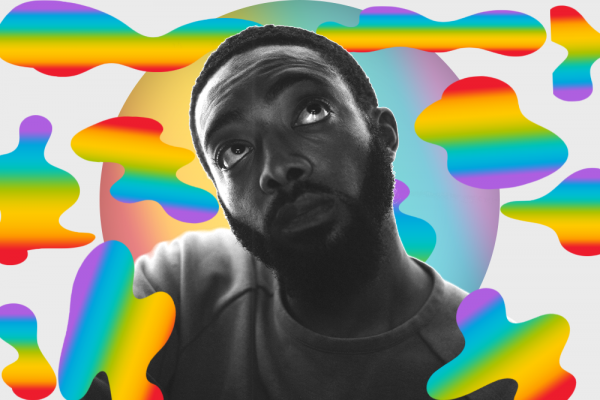Jeremiah Givens — better known as the rapper JGivens — suggests that you think of him as “your favorite rapper’s favorite rapper.” He makes the suggestion with a smile, in some jest, but he still means it.
Givens, now a veteran emcee, has been a premier rapper in the niche genre of Christian hip-hop (CHH) for the last decade. Musically, Givens is known for his smooth and sporadic delivery, his lyrical wordplay, and his willingness to share his life transparently on the microphone. But during the beginning of his career, there were parts of his life he had to keep hidden.
“I couldn’t tell anybody. It took me a long time to tell myself, to say it aloud,” Givens told Sojourners. “I knew what I was doing, but to actually look in the mirror, or to even say ‘I’m gay,’ that was a whole thing.”
Now, after celebrating his fifth Pride Month since coming out, he’s reflecting on his legacy as the “first openly gay Christian rapper.”
Early career
El V. Envy, Givens’ first official album, was well-received and solidified his breakthrough as one of the most popular rappers in CHH. His excellence gained him a spot on the “2013 Freshman Class” for Rapzilla.com, a popular website dedicated to CHH, and months after the albums’ release, he signed to Humble Beast, a premier label in the genre.
After releasing the album Fly Exam with Humble Beast, Givens left the label, but his star kept rising. He landed a spot on Lecrae’s Church Clothes 3, which debuted at No. 1 on the Billboard Rap/Hip-Hop Albums list.
It was then, in 2016, that he began to open up to his family and friends about all the things he had not explicitly shared with them. In his own words, his life was unravelling. He was addicted to drugs, HIV positive, and gay. Jason Petty, Given’s mentor better known as rapper/poet Propaganda, was one of the first people Givens told his secrets. In one conversation, Givens told him everything.
“Prop[aganda] had a sliver of time to process a whole lot, and made a decision that showed how cool he actually was to me and the type of man that he is,” Givens said. “There was never a hiccup … He never missed a step as far as me being his little homie and helping me navigate that stuff.”
As he came out in his personal life, Givens contemplated coming out professionally in an open letter. A friend and collaborator, Christian Padron, complimented the letter Givens wrote, but convinced him that if the letter wasn’t for his own sake, he didn’t owe it to anyone. So instead of a formal announcement, Givens “officially came out” two years later, in a reply to a tweet that directly asked if he was gay. The reverberations were far more dramatic than the announcement.
Testing the boundaries of Christian hip-hop
Christian hip-hop has been dominated by the type of masculinity that is common in both hip-hop broadly and Reformed Christianity specifically. This bravado contributes to intra-communal arguments about who belongs to CHH and who doesn’t. Stars like Lecrae, Chance the Rapper, and Kanye West, or practically anyone who rapped about faith, have been subject to this gatekeeping. Even rappers trying to avoid the question aren’t exempt from the debate about whether they are a “Christian rapper” or a “rapper who is Christian.”
This is representative of how many of the genre’s fans treat their musicians: They debate, define, and dismiss anyone who doesn’t reach an immeasurable standard for representing Christ in hip-hop.
Givens’ coming out was an unintentional stress test of whether the genre had any room for queer Christians.
“Being queer in a very conservative, homophobic, transphobic, very religious environment and you pop out like that, it will definitely separate the wheat from the tares as far as who’s with you,” he said.
Rapzilla stopped writing about him (Givens turned down most media requests in that period, but the site hasn’t written about any of his subsequent work since he came out). Some artists kept supporting him, others wouldn’t work with him publicly, and others stopped talking to him altogether.
“That experience was very jarring,” Givens said. “I had like 60,000 followers and that shit just went down by [tens of thousands] and [it felt like] ‘oh my God, I’m losing everything.’”
But the personal blessings of coming out outweighed the public backlash. While fans sneered that they would “pray for him,” he was healthier and happier than he was while in the closet.
Propaganda said that witnessing Givens’ coming out presented him with the dissonance of what he thought scripture taught and what he could see in his friend.
“Now it’s not just a theological point, this is my friend,” Propaganda said. “I have to reckon with what’s in front of me, and what’s in front of me is this man I know, I admire, I love, I’ve traveled with, I believe in, I’ve seen the spirit of God in him.”
As a legendary figure in CHH, Propaganda was bound to be asked his opinion once Givens came out publicly; but he set hard lines on when to speak, as he “never wanted the story to be ‘what does Prop think about JGivens?’”
Propaganda hopes that CHH listeners will learn from Givens and begin treating the LGBTQ people in their lives better.
“Now, he’s the happiest I’ve ever seen him; he’s the healthiest I’ve ever seen him,” Propaganda said. “I adore him. While you never want to make a mascot out of anybody’s life, I do hope that people can — especially during Pride Month — at least just listen.”
Supporting Black, queer youth
When he’s not rapping, Givens works as an executive assistant at REACH LA, a nonprofit that “strives to educate, motivate and mobilize youth around sexual/reproductive health, culture and self-preservation.” Working with Black, queer youth often makes Givens feel like he’s able to recapture the moments he wasn’t able to experience during his own adolescence.
“I went through certain things because [I was in the closet] — certain [traumas] that I wasn’t able to share with anybody; I was alone,” Givens said.
But he’s presciently aware that even those who are out and proud as youth will face challenges — like housing insecurity, or being exiled from their family and friends — that he didn’t.
REACH LA also offers arts programs such as ballroom dance. Givens first began composing music after learning the viola in junior high school; now he has the chance to provide art opportunities for other young creatives.
Continuing his rap career
When asked about future goals and dreams, Givens said he just wants to drop more albums. His first project after coming out, 2019’s Domino, isn’t a departure from his previous material, but now he can pursue the same topics — faith, relationships, challenges — with a new freedom.
“I wonder in tears / I’m crying now for queers,” he raps on the album’s second song. “Glad I rap? Can I raise a kid?” he asks of his listeners on another track.
Lyrically, Givens no longer has to hide his sexuality or discuss addiction through obscured language.
“It was always in my music, it wasn’t explicit, but … the pleas for some sort of help because of the depression and because I’m an addict,” Givens said. “[My] being addicted to meth, that had a direct correlation with the epidemic of meth users in the gay community, and that was its own other nuance that I didn’t get to really flesh out in my artwork because I didn’t want to tell all the details.”
Spirituality remains evident on the album, even if he no longer claims particular labels.
“I wouldn’t say I express my faith in the same ways that I did years before … it’s not a mission for me,” Givens said. “The evangelism fabric that comes with the call to go speak and articulate in this way about your faith, I don’t do that anymore as much. I’ve sat back into the person I am and always was.”
Got something to say about what you're reading? We value your feedback!






